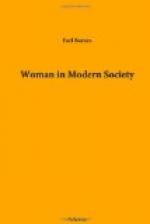And yet the danger could be greatly reduced by proper education of youth. At present we are educating 10,000,000 girls in the state schools of America, and as many boys. They are spending eight to twelve years, under the direction of celibate women teachers, sharpening their intelligence. Their most important work in life is to be the making of homes, but they are supposed to master this art through imitating the homes in which they grow up. Many of these are unworthy of imitation, and they are all in process of transition.
Every girl should be thoroughly trained in handling an income and in spending money wisely. She should have a general knowledge of household sanitation, of water-supply and sewage, of foods and their preparation. She should know about clothes, their cost, wearing qualities and decorative values. She should have a sense of the family and its significance in life; of at least the social relations that husband and wife must maintain toward each other if their partnership is to be happy and effective. She should have the beginnings of a eugenic conscience established in her, and she should know something of the care of infancy. All this should be given in the school, if it is not definitely given in the home, and no girl who goes through the eighth grade should escape it. Before the girl is married, she should have wise counsel from mature women who have lived and learned the art of living. Boys should, of course, also be trained in comparable directions for this great part of their lives.
Something is already being done in this direction through the establishing of special courses in domestic science, and allied branches in our schools. The fact that educational leaders are awake to the need was shown by the applause that followed Superintendent Harvey’s plea for this training in his paper on the education of girls at the Superintendents’ Association in St. Louis in February, 1912.[58] The leading educators of the country greeted his plea with an enthusiasm called out by no other paper of the session.
[58] See Report of the Department of Superintendence of the National Education Association, 1912.
Every woman, then, and every man, not debarred by disease or accident and not specially dedicated to a work which precludes marriage, should spend his life in a family group, not that the state may have more soldiers, or factory employees, but that he may realize the deepest significance of his life. In this life the woman should be as free as the man, an equal financial partner, and should share in all the social and political opportunities of the community. When she bears children, she should have special protection, support and reverence; and support should come from the father of her children. If he fails her, then the group, in its capacity as a state, should care for her honorably. But to justify this protection and reverence, she should bring to her special functions as mother of the generations a strong body, an intelligent mind, a eugenic conscience and an absolute devotion to the children born of her love.




